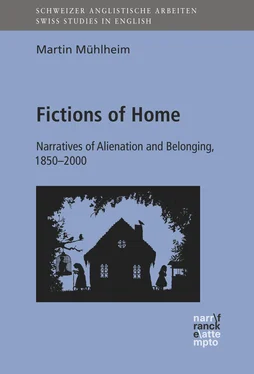Whenever I find myself growing grim about the mouth; whenever it is a damp, drizzly November in my soul; whenever I find myself involuntarily pausing before coffin warehouses, and bringing up the rear of every funeral I meet; and especially whenever my hypos get such an upper hand of me, that it requires a strong moral principle to prevent me from deliberately stepping into the street, and methodically knocking people’s hats off – then, I account it high time to get to sea as soon as I can. (18; ch. 1)
Ishmael’s use of the word “whenever” in this passage reveals that a profound sense of alienationalienation is a recurring problem in his life, and that his going to sea is a rather desperate attempt to prevent himself from committing random acts of aggression against innocent bystanders (“methodically knocking people’s hats off”). His genial tone should thus not seduce us into underestimating the extent of his crisiscrisis of unbelonging.
The idea that Ishmael’s sense of alienationalienation is more fundamental than it appears at first sight is confirmed by his very name, which constitutes an intertextualintertextuality link to biblical exileexile. According to the bibleBible and biblical motifs, Ishmael is one of the sons of Abraham, and God prophesies before his birth that Ishmael’s “hand will be against every man, and every man’s hand against him” (Genesis 16: 12). The name Ishmael is therefore, as Wadlington WarwickWarwick, Wadlington observes, “a synonym for alienationalienation between the name-bearer and all other men” (141). Moreover, the phrase MelvilleMelville, Herman’s first-person narrator uses to open his tale – “ Call me Ishmael” (emphasis added) – sounds as if we were not given the narrator’s real name, but instead a pseudonym chosen “for patently symbolic reasons” (WarwickWarwick, Wadlington 141; see also EagletonEagleton, Terry, How to Read Literature 23).55 Like the deceptively light-hearted passages discussed above, the narrator’s name thus indicates that all is not well between him and his fellow men.
At the same time, it is possible to read the choice of the name Ishmael as one instance of what Samuel KimballKimball, Samuel calls Ishmael’s desiredesire to “make a narrative home of homelessnesshomelessness” (541): to mitigate his own sense of alienationalienation by refracting his experience through the stories of others. Sigmund FreudFreud, Sigmund, for instance, suggests that comparisons and analogies have the capacity to reduce unfamiliarity: “[W]e compare the less familiarfamiliarity with the more familiarfamiliarity, […] and use the comparison to explain the item that is more difficult and unfamiliar” ( The Joke and Its Relation to the UnconsciousUnconscious 202; see Punter 90).56 Accordingly, if the name is indeed a pseudonym adopted by MelvilleMelville, Herman’s narrator, then the implicit comparison between his own experiences and the familiarfamiliarity biblical story of Ishmael may be read as an attempt symbolically to reduce his sense of isolationisolation. Perhaps more importantly, however, the intertextualintertextuality reference serves to reduce unfamiliarity on the part of the reader – at least, that is, if we assume “that writer and audience possess a common knowledgeknowledge” (WarwickWarwick, Wadlington 141), for the allusionallusion only has this effect for those who are familiarfamiliarity with the biblical narrative. This, in turn, reminds us of the double-edged quality of intertextualintertextuality home-makinghome-making practices, as those readers who are unfamiliar with the biblical narrative may end up feeling excluded from the novel’s implied readership (see introduction).
Examining further the biblical parallel established in Moby-Dick , we find that both the novel’s narrator and the biblical Ishmael are treated badly by their step-mothers, which may imply that there is a link between alienationalienation in later life and the lack of a stable childhoodchildhood home. In the biblical account, Abraham’s wife, Sarah, at first proves unable to bear childrenchildren, and so Abraham “went in unto Hagar,” Sarah’s maid, who eventually gave birth to Ishmael (Genesis 21: 16; KJV). Immediately there is strong tension between Sarah and her maid, and when many years later Sarah miraculously gives birth to Isaac, she urges Abraham to banish Ishmael and his mother: “Cast out this bondwoman and her son: for the son of this bondwoman shall not be heir with my son” (Genesis 21: 10; KJV). Initially Abraham is reluctant, but when God assures him that he will protect Ishmael, Abraham complies with Sarah’s wish to have Ishmael removed from the communitycommunity. The relationship between Sarah and her stepson can thus hardly be called particularly loving. Similarly, in Moby-Dick , the narrator recalls that his stepmother “was all the time whipping me, or sending me to bed supperless” (37; ch. 4). This, in turn, explains the narrator’s choice of metaphormetaphor later in the novel, when he speaks of a “step-mother world, so long cruel – forbidding” (405; ch. 132). Never fully at home even as a child, MelvilleMelville, Herman’s Ishmael remains unable to belong in later years.57
The resulting desiredesire to “make a narrative home of homelessnesshomelessness” (KimballKimball, Samuel 541) explains, among other things, why Ishmael is so interested in the character of Perth, a blacksmith, whose alienationalienation from society, too, is connected to a broken home. Ishmael introduces Perth, whose function on the level of plot is relatively marginalmarginality and marginalization, with a detailed account of the story of his life.58 Formerly an “artisan of famed excellence,” with a “youthful, daughter-like, loving wife, and three blithe, ruddy childrenchildren,” Perth becomes fatefully addicted to alcohol and eventually goes bankrupt, with his wife and children dying in abject povertypoverty (368–369; ch. 112):
Death seems the only desirable sequel for a career like this; but Death is only a launching into the region of the strange Untried; it is but the first salutation to the possibilities of the immense Remote, the Wild, the Watery, the Unshored; therefore, to the death-longing eyes of such men, who still have left in them some interior compunctions against suicidesuicide, does the all-contributed and all-receptive ocean alluringly spread forth his whole plain of unimaginable, taking terrors, and wonderful, new-life adventures […]. (369; ch. 112)
Forever estranged from the “equally abhorred and abhorring, landed world” (369; ch. 112), Perth seeks refuge in the oblivious infinity of the “all-receptive ocean” – partly because of “some interior compunctions against suicidesuicide.” This latter point is important because Ishmael, too, has felt tempted to end his life, but opts for going to sea instead, as a “substitute for pistol and ball”: “With a philosophical flourish Cato throws himself upon his sword; I quietly take to the ship” (18; ch. 1). Both Perth and Ishmael, then, are trying to escapeescape from the memories of broken homes, and going to sea is an attempt to prevent aggression not only against others, but also against themselves: a truly Freudian sublimation of a seemingly implacable death drivedeath drive.
Of course, in Freudian psychoanalysispsychoanalysis and psychoanalytic criticism, the death drivedeath drive is not merely the bane of unhappy individuals with difficult pasts, but a universaluniversal condition of human life.59 Therefore, it is perhaps not surprising that Ishmael – after initially portraying his urge to go to sea as merely an incidental, individual problem – suddenly suggests that all humans necessarily suffer from a similar sense of alienationalienation. Ishmael at first remains relatively cautious, asserting only that “ almost all men in their degree, some time or other, cherish very nearly the same feelings towards the ocean” (18; ch. 1, emphasis added). However, he quickly abandons any such show of circumspection, suggesting instead that man’s mysterious attraction to the ocean is an inevitable by-product of human selfhoodself as such:
Читать дальше












